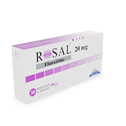PSYCHIATRY
Psychiatry is the medical specialty dedicated to understanding, diagnosing, preventing, and treating mental illnesses. Psychiatric disorders result from the combination of a vulnerable biological and/or genetic background and triggering factors such as stress, illness, and addiction. These disorders, which can be permanent or temporary, affect 1 in 5 people every year, from children (child psychiatry) to the elderly (geriatric psychiatry).
When behavioral (compulsive disorders, agitation, aggression, withdrawal) and/or cognitive (memory and concentration disorders) symptoms affect a person's interactions with their environment, it is often the family members who react. Depending on the patient's condition, a consultation with a psychiatrist takes place in a private office, in psychiatric units of a hospital, in public mental health facilities, or in emergency services during crises. If necessary, evaluated by a physician, these crises can lead to hospitalization, either involuntarily or at the request of a third party.
In addition to the most well-known mental illnesses (such as schizophrenia, depression, bipolar disorders, and autism), the psychiatrist also treats :
- Eating disorders (anorexia, bulimia),
- Personality disorders,
- Attention deficit disorders,
- Sleep disorders,
- Neurocognitive disorders - related to dementia or stress/trauma.
- Anxiety disorders (OCD, phobias)
- Addictions and disorders related to drug and alcohol consumption.
Treatment may include psychotherapy sessions (such as psychoanalysis, brief therapy, hypnosis, cognitive-behavioral therapy...), therapeutic workshops - also available in day hospitals - medication, and even more sophisticated techniques (neurostimulation).






